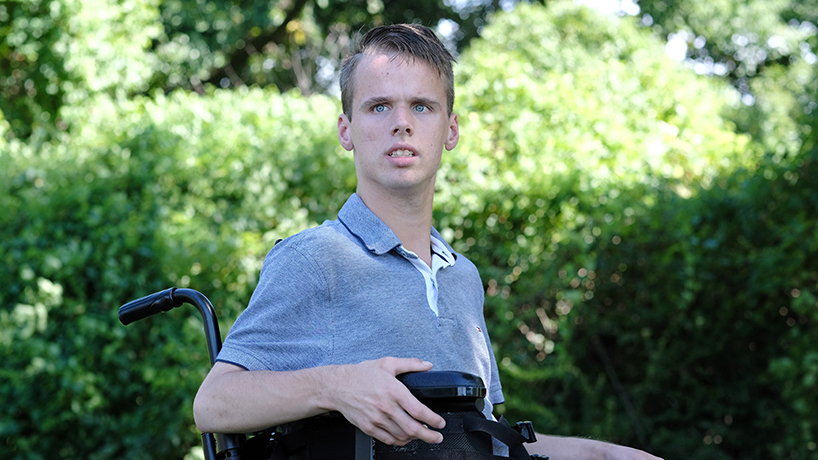
Andrew Simmons developed his voice thanks to augmented and alternative communications when he was a 14-years-old. Now a first-year student at UMSL, he hopes to study political science and get involved with the Political Science Club, Revolution Campus Ministry and the Able-Disable Partnership. (Photo by August Jennewein)
Andrew Simmons’s Facebook page contains a record of the experiences of his life: walking across the stage at Fort Zumwalt West High School and receiving his high school diploma, cooking and trying new foods, photographs from camp, testaments to friends and teachers and excitement over starting college at the University of Missouri–St. Louis.
In other words, a typical first-year student.
But Simmons’ path to the start of his college experience is unique. Living with autism, a movement disorder and cerebral palsy, he is nonspeaking but found his voice in 2014 using augmented and alternative communications, primarily typing.
“The great thing is the possibilities are endless now that you have found your voice,” he wrote on his Facebook page while giving advice to a friend.
That’s undeniably true of Simmons, who is already making his mark on the world through advocacy and sharing his experiences through venues such as the 2020 Adam Morgan Foundation Power of Neurodiversity Conference.
Where are you from? What’s your family like?
I was born in Indiana and moved to St. Louis in the fifth grade. I have two brothers Daniel (16) and Alex (10). I have a service dog named Campbell, who is 9, as well. I live at home with my parents and am taking online classes this semester.
Can you describe your experience of being autistic?
I try to think of myself like anyone else. I don’t see myself as autistic primarily. Really, I think it’s a combination of being super attuned to the world and being stuck in a physical body that doesn’t control itself like I wish it would. I think of those who can’t speak who have no way to communicate, and I consider it a mission to help those who have no voice.
You use a computer to communicate. How does that work? When did you start using this method? How has it changed communication for you?
Prior to the age of 14, I had no real way to communicate. It was terrible to feel alone and not be able to tell people I was trying to be included. But after learning to type to communicate, I am able to be a part of so much more. I get a real education and a chance for a real life I never had before. I type on an iPad a little but use a letter board most of the time to communicate. It is faster, but I like the iPad better because it is my voice.
Some people might describe being autistic as a challenge, but I am guessing that it also gives you certain strengths that other people don’t have. What strengths do you identify in yourself?
I feel I can sense things other people can’t because I am nonspeaking. I have to listen more than I talk, so I hear things others hope to hear, but they try to speak too much and miss out on brilliant findings by just listening.
What do you wish people knew about autism or interacting with you?
I wish people would see me as a person just like anyone else. I am nonspeaking and in a wheelchair, which might be intimidating, but inside I’m just like everyone else. Not being included or spoken to is so hurtful, so please be mindful of thinking of me as a person first.
What interests did you have while growing up through high school?
Reading Word War II books, traveling, watching sports and riding roller coasters
How did you decide that you wanted to attend school at UMSL?
The disability accommodations are excellent, and I felt thought of as a person first and not a disability.
How did you find out that you’d be accepted? How did you feel when you found out?
I got an email that told me I was accepted, and I was thrilled! To think someone with my limited physical ability was accepted was a dream come true!
What are your academic interests, and what do you think you might want to study?
I think I would like to major in political science with a focus on public policy. I find helping those with similar needs a passion of mine.
What classes are you taking this semester? Which one are you most looking forward to?
I am taking “First Year Writing” and “Introduction to Political Science,” and am looking forward to my political science class the most.
Do you hope to be involved with any clubs or societies at UMSL?
I am interested in Political Science Club, Revolution Campus Ministry and the Able-Disable Partnership.
What are your goals for yourself?
I don’t know where I want to work yet, but I know I would like to be involved in advocating for others going through similar struggles. I would also be thrilled to meet others and get involved here at college.














